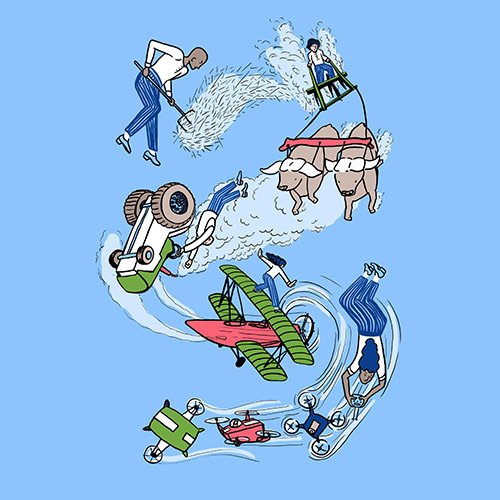Why companies need strong but lean HR departments to create the ‘tribe vibe’
Jul 01, 2019
8 mins

What are millennials?
‘Millennials’: who hasn’t heard the term being thrown around? Indeed, this demographic cohort of 18-34 year olds has grown into somewhat of a buzzword in recent years. But what exactly do we mean when we call someone a millennial? Though definitions vary strongly, millennials are often defined by two particular - and often mutually reinforcing - traits: an aptitude towards technology, coupled with a liberal worldview. Another characteristic of millennials is that they are prime witnesses to the global financial crisis of 2008, an event that defined their expectations about the future and their eagerness to challenge the status quo. What do we get when we throw these ingredients into a blender? A tech-savvy generation of idealists for whom doing good in the world by helping others and the environment is as important as achieving personal career success.
The millennial disruption
They’re predicted to represent 75% of the workforce by 2030, an impressive figure by any standard. Many commentators are now speculating about how these fresh employees will disrupt the way traditional companies are structured. Startups seem to be prime candidates for attracting these bright young minds, but what about more conventional businesses? Are they sufficiently prepared to take in these tech savvy do-gooders once they flood the labor market?
The bulk of literature on this issue focusses on the technological side of the debate. The main argument is that businesses need to update their technological infrastructure to better match the needs of millennials, whose lifestyles are so deeply intertwined with - and defined by - technology that putting up with legacy systems is out of the question. There’s also talk of adapting company culture to better meet the needs of millennial workers, a trend that’s rapidly gaining ground as we witness the disappearance of traditional hierarchies and chains of command. To some extent, business has already adapted to these developments: startups are popping out of the ground by the hundreds of millions every year, and CSR (corporate social responsibility) is the newest hype.
Half of today’s workforce claimed to be willing to take a 15% salary cut to work for an organization that is positively changing the world.
What is discussed less often, however, is the view from the HR perspective: what are the challenges faced by HR departments, and how should they adjust their recruitment procedures to better adjust to the needs of their changing workforce? Are HR professionals a dying breed, or can they move with the times?
The times are a-changin’
The first order of the day for any forward-thinking HR department should be attracting millennials to the company. But this is easier said than done. Recruiting millennials is a relatively new field. In this unchartered terrain, figuring out what attracts millennials to your company is key. To do this, some out-of-the-box thinking is needed. HR departments need to abandon the conventional toolkit of financial incentives and embrace an entirely new spectrum of incentives. It’s not that millennials are too idealistic to care about money; this rather cliché definition of ‘millennialism’ has been challenged by a report this year suggesting that recent events such as the US elections, the Brexit vote and increasing terrorist attacks have significantly shaken this generation’s optimism. It just means that financial benefits are no longer the only thing that’s relevant to the majority of millennials.
So, what then are some of the alternative incentives that HR professionals should be embracing? For starters, it’s the big V-word: values . According to a Deloitte survey, 47% of millennials claim that the “purpose of business is to ‘improve society and protect the environment.” Half of today’s workforce claimed to be willing to take a 15% salary cut to work for an organization that is positively changing the world. Of course, these numbers should be taken with a pinch of salt, especially since the need for job security and financial stability has increased in the aftermath of the 2008 recession. Nevertheless, they are indicative of a trend that is only likely to increase as older workers retire and more and more millennials join the workforce.
Other popular factors include the need for flexible working opportunities, a creative working culture, a “positive energy” and a healthier work-life balance. For some millennials, choosing where to work may be impacted by aesthetic considerations, such as how the office is designed and even what their coworkers dress like. HR departments will benefit from taking these things into account when developing their recruiting strategies.
They want to belong to what LinkedIn’s Reid Hoffman calls a “tribe”. Not just a company, but a community of kindred spirits. By tapping into this need and using metrics to segment their workforce more effectively, HR departments can make a huge difference in attracting these bright young minds to their company.
Note that, until recently, these are not the things that HR departments - or employees for that matter - would have ever considered an essential part of the job hiring process. Indeed, some of the things millennials find important are typically associated with subcultures, but that’s precisely the point: what millennials seem to want, more than anything, is to identify with their company and their peers while having the space to express their own ideas and develop their personality. They want to belong to what LinkedIn’s Reid Hoffman calls a “tribe”. Not just a company, but a community of kindred spirits. By tapping into this need and using metrics to segment their workforce more effectively, HR departments can make a huge difference in attracting these bright young minds to their company.
At the same time, recruiters also need to be wary of ‘selling the dream’. Among millennials, there is a significant gap between perception and reality. Setting realistic expectations to avoid disappointment is therefore just as important as communicating the company’s values. If companies want to continue to attract millennials, they should compare what their recruiters are “selling” with the reality experienced by their employees. To this end, a smooth feedback system with regular check-ins is essential.
Creating the tribe vibe, one step at a time
In fact, that’s only half the job, since millennials are known to be ‘job-hoppers’. They will leave if they do not believe that they are receiving any personal benefit or growth. The key question, then, is how to keep them happy for long enough. This is where the ‘tribe’ comes into play. HR professionals can play a crucial role in fostering a sense of community and making sure the work-life balance is respected. This could be achieved by addressing the increasing overlap between the private lives and office lives of modern workers. To this end, companies can learn from the typical startup office environment that offers daycare, a gym, drinks, music and leisure - think of the cliché ping-pong table. Indeed, these developments - if somewhat cosmetic - are a step in the right direction. More fundamentally, building the ‘tribe vibe’ includes working together with managers. After all, tomorrow’s boss is as much a coach as a decision-maker. HR departments can be key in stimulating managers to embrace mentorship as a strategy.
In terms of concrete HR policies, a way to address millennials’ needs and build the ‘tribe vibe’ is to do things differently. Sometimes, that simply means doing less, for instance by replacing the classical employee performance review - perhaps the most feared and hated HR policy of all time - with a review system rooted in constructive dialogue. For decades the performance review has been a core tenet of companies. According to a recent survey, only 1% of American companies have eliminated the traditional review, with most of them being startups. That’s why eliminating the review is still considered to be a radical move; HR departments worry that eliminating the performance review weakens the legal base for dismissing under-achieving employees.
Yet it is precisely what Tom DiDonato- head of HR at Lear - did by replacing performance reviews with quarterly sessions during which employees converse with their managers. In DiDonato’s own words:
We believe that traditional performance reviews do little to motivate people. The way to drive high performance is through honest feedback that employees and managers really hear.
These feedback sessions are a chance to share the challenges they face and consider the skills they need to progress in their work. DiDonato’s philosophy fits perfectly with the millennial mantra, and more and more literature is emerging that supports this logic.
Another way in which HR professionals can do better by doing less, is by eliminating unnecessary bureaucracy to better manage employees. Granted, this is not necessarily a new idea: for a long time, HR was synonymous with unnecessary paperwork. This earned it a pretty bad rep, the culmination of which was the widely-read 2005 article ‘Why we hate HR’ . Today, a decade later, HR departments have cut down on bureaucracy. They are no longer necessarily considered as creativity-killers. In fact, HR departments have adapted so quickly that some are beginning to wonder whether the idea of human resource management is even necessary. Take, for instance, Patty McCord’s infamous 124-page manifesto- often referred to as the most important document to have ever emerged from Silicon Valley - advocating a lean and nimble HR-policy, aimed at identifying and growing the elements that make up the ‘tribal’ company culture and allow it to achieve its full potential. Ironically, some speculate that McCord’s ‘revolutionary’ system is ultimately what cost her her job. It is possible, therefore, that the trend for greater employee flexibility, less regulation and less paperwork may eventually altogether eliminate the role of HR departments.
The end of HR? Not at all.
If the golden rule seems to favor “less is more”, surely the key to success is to gradually phase out HR as a department altogether? Not according to Robert Siegel, venture capitalist and lecturer in organizational behavior at the Stanford Graduate School of Business, who fervently opposes this idea. In his article ‘the best company culture is not where everyone gets a hug ’, Siegel offers a counterweight to the increasingly popular startup model, criticizing the idea that HR is outdated:
(…) The best companies have HR as an executive position and a seat at the table.
In his video-interview for the Stanford GSB, Siegel perfectly sums up the core of the HR vs. Tribe debate by bringing both sides together. He argues that, in a healthy company, HR provides the water that nurtures the ‘tribe’ and allows it to grow. Siegel’s basic idea is that while a powerful ‘tribe’ - consisting of common language, goals, relationships - is vital for growth and success, it has an equally ugly side. A company can quickly turn too tribal, leading to isolation and even “tribal warfare”. That’s why you need a proper HR department to impose the necessary discipline, while avoiding bureaucracy where possible. HR, being the ‘Chief People Officer’, is the most important function in the company, as it manages its most important asset: its people.
In an age where the popularity of millennials and startup culture propel us into disrupting existing corporate structures, Siegel teaches us that radical reform isn’t always warranted. There’s no need to reinvent the wheel: instead, growing your company’s ‘tribe’ must be spearheaded by HR professionals who are experts in ‘best-practices’ and coaching.
Another reason to maintain a strong HR department is related to the issue of company scale. It’s not a coincidence that these radical examples are outliers: the majority of companies hesitate to follow the trends set by McCord and DiDonato. That’s because radical reform is a tempting idea that gets more difficult to implement as the size of your company increases. As processes increase in complexity, there is less space for experimentation with different HR policies. Not to mention that the consequences of restructuring are more far-reaching as company size increases.
In short, companies are facing a future in which millennials continue to disrupt traditional corporate structures in search of a “tribe”. This forces HR departments to adapt their recruiting procedures and employee policies accordingly. Even if we are currently overestimating the extent to which millennials will disrupt business in the future, traditional HR departments - especially in larger companies that cannot easily implement the startup ‘model’ - will still need to reinvent themselves. The question is: at what pace? Robert Siegel envisions the ‘tribe’ as a positive force, but only if it is spearheaded by sound HR expertise. Despite what tech-optimists or utopians may claim, HR departments are unlikely to disappear completely. But HR professionals need to assume responsibility be given space to create the tribe vibe. Only then can companies attract and keep tomorrow’s best and brightest - leading to a happier, healthier, more creative workforce.
Worth a try, I’d say.

More inspiration: Employer branding

How to make your Glassdoor page an asset
50 million unique visitors flock to the Glassdoor social platform, making it the second most popular job site in the United States.
Feb 23, 2021

Recruitment marketing: the future of talent acquisition?
Recruitment marketing is the combination of digital technology and recruitment techniques to acquire high-quality talent.
Sep 16, 2019

How blockchain could transform the core of HR
Accelerate fundamental HR processes, secure payroll, verify candidate's informations ... what blockchain brings to HR.
Aug 12, 2019

The American Dream in Europe?
This study highlights a global reflection on the new challenges of the entrepreneurial culture in France and the ecosystem that accompanies it.
Aug 09, 2019

Do Androids dream of stealing our jobs?
47% of current US occupations are at high risk of being replaced by machines. This revives a timeless debate that has pervaded recent history.
Jul 22, 2019
Inside the jungle: The HR newsletter
Studies, events, expert analysis, and solutions—every two weeks in your inbox

